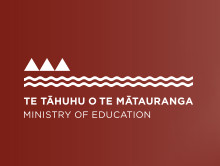I Muri i te Pānui Pukapuka
After Reading
Ka taea e te pouako te whakamahi i ēnei ngohe hei aromatawai, hei whakawhānui hoki i ngā pūkenga o ngā ākonga.
Possible assessment and extension activities.
1. Ākina ngā ākonga kia matapaki i ngā pātai nei:
- He aha ngā akoranga matua kua mau i a tātau mai i tēnei pukapuka?
- Kua whakautua āu pātai mō ngā taonga pūoro? Ki te kore, rapua he whakautu mā tētahi atu huarahi, arā, i te whare pukapuka, i te ipurangi, i ō whanaunga rānei.
Encourage students to discuss the following questions:
- What are the main ideas we have learnt from this book?
- Have your questions about taonga pūoro been answered? If not, find some answers in another way, that is, from the library, the internet, or ask your relations.
He Hokinga Whakamuri hei Kōkiringa Whakamua
Ideas for Reflecting on Learning and Planning Next Learning Steps
1. Kia uia e ia tamaiti tētahi kuia, koroua, pakeke rānei o tō rātou whānau, mō tētahi waiata, tētahi taonga pūoro i whakamahia, i a rātou e taitamariki ana. Kātahi ka whakaatu i tētahi pārongo mā te kauhau, mā te whakaaturanga hiko rānei.
Each student interviews their koroua, kuia, or an adult about a song and a musical instrument they used to sing or play as children. Then they present a report or a computer-assisted presentation.



